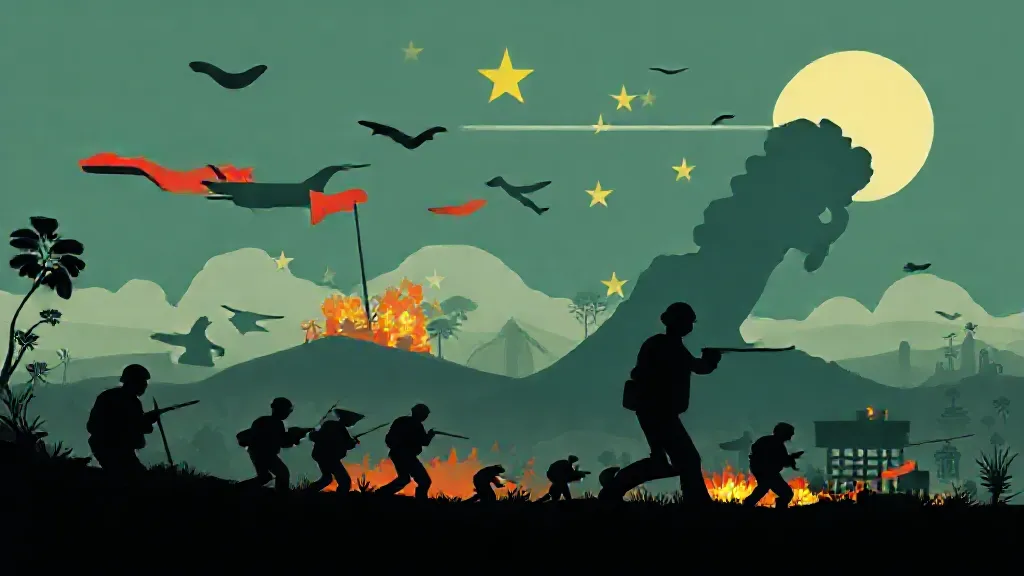The Vietnam War, a protracted conflict that lasted from the late 1950s until 1975, was marked by significant events that shaped its course and outcome. The war involved complex geopolitical factors, a struggle for independence, and the ideological battle between communism and democracy. Understanding the key events of the Vietnam War is essential to grasp the broader implications it had not only for Vietnam but also for the United States and the world.
The Beginning of the Conflict: French Colonialism and the First Indochina War
The roots of the Vietnam War can be traced back to the end of World War II when Vietnam sought independence from French colonial rule. The First Indochina War (1946-1954) saw the Viet Minh, led by Ho Chi Minh, fighting against French forces. The war culminated in the decisive Battle of Dien Bien Phu in 1954, where the Viet Minh emerged victorious.
This victory prompted the Geneva Accords, which temporarily divided Vietnam at the 17th parallel, establishing North Vietnam under communist control and South Vietnam as a separate entity backed by the West.
The Escalation of U.S.
Involvement: The Domino Theory and Military Advisors
As tensions rose in Southeast Asia, the United States adopted the "Domino Theory," believing that the spread of communism in Vietnam would lead to a chain reaction across the region. In the late 1950s, the U.S.
began sending military advisors to assist the South Vietnamese government. This marked the beginning of direct American involvement, as President Eisenhower committed resources to support the anti-communist regime led by Ngo Dinh Diem.
The Gulf of Tonkin Incident: A Turning Point for U.
S. Engagement
The Gulf of Tonkin Incident in August 1964 served as a pivotal moment that escalated U.S.
involvement in Vietnam. Allegations of North Vietnamese attacks on U.S.
naval vessels led Congress to pass the Gulf of Tonkin Resolution, granting President Lyndon B. Johnson the authority to use military force without a formal declaration of war. This resolution paved the way for the deployment of ground troops and a significant increase in air strikes against North Vietnam.
The Tet Offensive: A Shock to American Public Opinion
In January 1968, the North Vietnamese and Viet Cong launched the Tet Offensive, a coordinated series of attacks on key cities and military installations in South Vietnam during the Vietnamese New Year (Tet) holiday. Although the offensive was ultimately a military failure for the North, it had a profound psychological impact on the American public. The stark contrast between the government's optimistic portrayal of the war and the reality of widespread attacks led to growing anti-war sentiment and protests across the United States.
The My Lai Massacre: A Turning Point in U.S. Morale
The My Lai Massacre, which occurred in March 1968, involved the mass murder of unarmed South Vietnamese civilians by U.
S. Army soldiers. The revelation of the massacre in 1969 sparked outrage and intensified anti-war protests.
It raised ethical questions about U.S. military conduct and further eroded public support for the war, highlighting the moral complexities of the conflict.
The Paris Peace Accords: Attempts at Resolution
In January 1973, the Paris Peace Accords were signed, aiming to establish peace in Vietnam and end U.S. involvement.
The agreement called for a ceasefire and the withdrawal of American troops, while allowing North Vietnamese forces to remain in South Vietnam. Despite the accords, fighting continued, and the political situation in South Vietnam remained unstable.
The Fall of Saigon: The End of the War
The Vietnam War officially concluded on April 30, 1975, when North Vietnamese forces captured Saigon, the capital of South Vietnam.
This event marked the reunification of Vietnam under communist control. The fall of Saigon symbolized the failure of U.S.
foreign policy in the region and had lasting implications for American society, leading to a reevaluation of military engagement and foreign policy strategies.
Legacy and Lessons Learned from the Vietnam War
The Vietnam War left an indelible mark on Vietnam and the United States, resulting in millions of casualties and widespread destruction. The war prompted significant changes in U.
S. foreign policy, leading to a more cautious approach in military interventions. Additionally, the conflict influenced public perception of government transparency and accountability, shaping the discourse around military actions in subsequent decades.
The lessons learned from the Vietnam War continue to resonate in contemporary discussions on international relations and military ethics.
